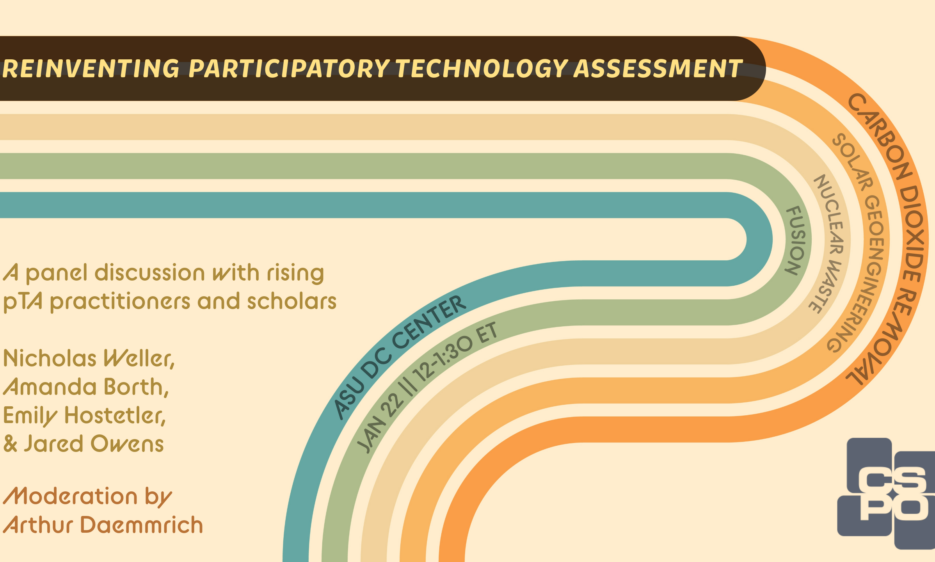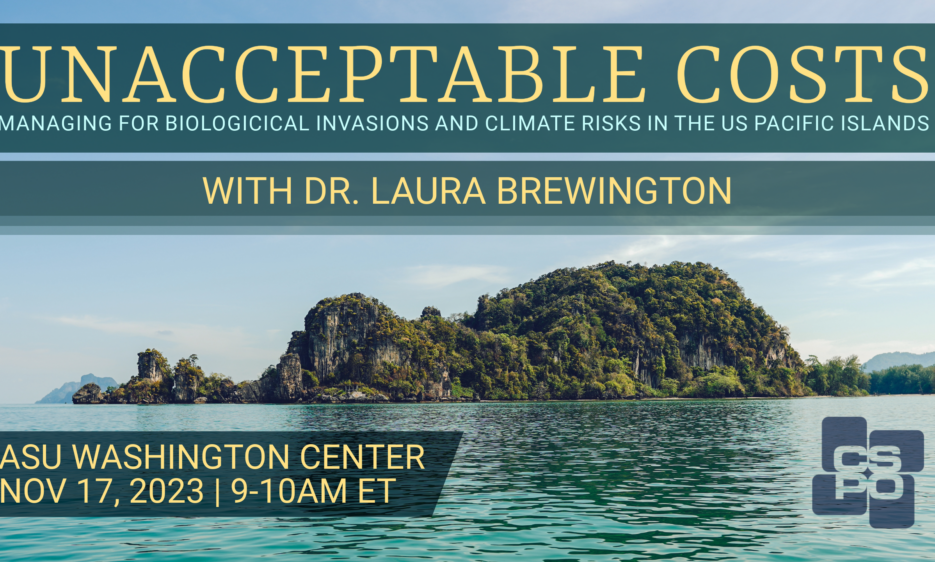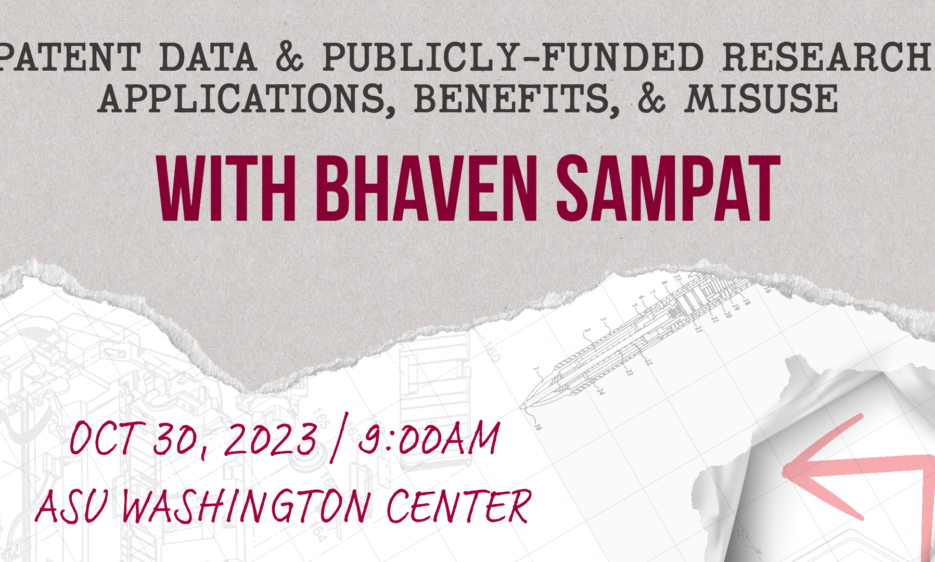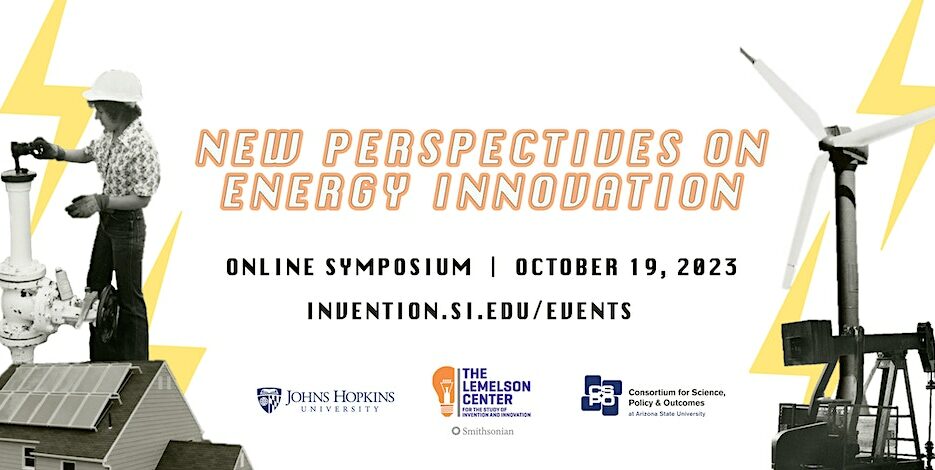Past CSPO Events
- January 22, 2024CSPO DC - New Tools for Science Policy
Reinventing Participatory Technology Assessment
A Panel Discussion on pTA Innovations with Rising Scholars & Practitioners

In this New Tools for Science Policy discussion, a panel of next-generation scholars and practitioners from ECAST will share how pTA is addressing the demands for procedural, distributional, intergenerational, and recognitional justice while advancing equity for disadvantaged and marginalized communities.
Nicholas Weller, Amanda Borth, Emily Hostetler, Jared Owens, Arthur Daemmrich
- November 17, 2023CSPO DC - New Tools for Science Policy
“Unacceptable Costs”: Managing for biological invasions and climate risks in the US Pacific Islands
Introducing the Pacific Regional Invasive Species and Climate Change Management Network

This seminar will present how the Pacific Regional Invasive Species and Climate Change (Pacific RISCC) network is helping communities and decision makers build resilience to the interacting threats of climate change and invasive species.
Laura Brewington
- October 30, 2023CSPO DC - New Tools for Science Policy
Patent Data & Publicly-Funded Research: Applications, Benefits, & Misuse

How does the public benefit from public investment in research and development? While there is broad agreement that new technologies have significant social and economic impact, tracing technologies back to federally funded research is challenging. To measure benefits, funding agencies, the national labs, and others often look to patent data. Recently, economists and legal scholars have raised questions about conventional measures (including simple patent counts and patent citations) linking public R&D to patents, and linking patents to social outcomes. On October 30th, Bhaven Sampat will review these concerns, and also describe and assess several new advances in patent bibliometrics that aim to overcome them.
Bhaven N. Sampat
- October 19, 2023
New Perspectives on Energy Innovation

New Perspectives on Energy Innovation
Join CSPO for a webinar series exploring lessons we can draw for the future from the past 50 years of energy policy and energy innovations. October 2023 marks the fiftieth anniversary of the 1973 oil embargo imposed by the Organization of Arab Petroleum Exporting Countries (OAPEC) in the wake of the Arab-Israeli War. The temporary shortages inflated energy prices, jolted the global economy, and destabilized geopolitical relationships around the world. The crisis also inspired new science and technology policies that drove innovation in nuclear, solar, wind, and geothermal energy sources, among others. Today, we are witnessing a resurgence in creative policy solutions and new energy innovations alongside high oil prices, geopolitical tensions, rising inflation, and attention to the environmental impacts of energy use.
In this online symposium, a distinguished group of historians, technology innovators, journalists, and policymakers will discuss the lessons we can learn from the 1970s and envision new futures for energy policy and energy innovation.
- June 15, 2023CSPO DC
Industry 4.0
Formal and Tacit Manufacturing Knowledge in Technology Transfer and Intellectual Property
In recent years, industry leaders and policymakers have begun to assess implications of a fourth industrial revolution that features rapid scalability from prototype to production, use of AI and robotics across the economy, and mass customization of consumer products. At the same time, nations are competing to attract high tech manufacturing through subsidies for strategic industries and enacting barriers to trade in areas of national interest. However, the manufacturing of electronics, medicines, and other technology products involves a complex mix of tacit (often trade secret) know-how and formal knowledge that can be protected through patents and trademarks. This panel will explore formal and tacit knowledge in technology transfer, manufacturing, and industry 4.0. In a period of increasing trade barriers, can technology transfer benefit both sending and recipient nations? What insights do we gain from history for the present situation, and how should policymakers respond to rapid technology change? What implications does industry 4.0 have for the IP system internationally?
Arthur Daemmrich
- April 05, 2023CSPO DC - New Tools for Science Policy
Quantity over Quality: How to Solve Electric Vehicle Charging Infrastructure
Electrifying the transportation sector would bring environmental, economic and equity benefits. However, a significant obstacle to the adoption of electric vehicles is our national charging infrastructure. Current charging infrastructure policy is guided by the needs of gasoline-powered cars, while ignoring many of the unique benefits that electric vehicles possess. Most recent policymaking has focused on high-speed chargers, where an individual can charge their car in minutes, as opposed to hours. These chargers are needed primarily during long distance travel, but they don’t satisfy the daily needs of most drivers. Charging policy should meet the needs of the consumer and incentivize ubiquitous slow speed chargers that allow drivers to charge anywhere, at any time.
On April 5th at 9AM ET, join Ryan Cornell (Arizona State University) for a New Tools in Science Policy seminar on why a paradigm shift needs to occur if we hope to effectively transition to electric vehicles and why electric vehicle charging policy should focus on the quantity of chargers, as opposed to the quality of chargers. He will use real world examples to outline what an idealized charging infrastructure would look like, and how we can develop charging infrastructure policy that accounts for the unique benefits and needs of electric vehicles.
Ryan Cornell
- March 29, 2023CSPO DC - New Tools for Science Policy
How Complexity Science Can Guide Urban Transformations
Lessons from Germany
Bastian Alm, Shade Shutters
- March 21, 2023CSPO DC
Rethinking the Green Revolution
On March 21 at 1PM ET, join journalist Dan Charles (NPR contributor), professor Prakash Kumar (Penn State), and author Marci Baranski for a panel discussion of Baranski’s book, The Globalization of Wheat: A Critical History of the Green Revolution and the legacy of the Green Revolution. Panelists will discuss both successes and shortcomings of the Green Revolution’s impact on wheat production as a rare convergence of biological and political forces. This model, however, may not be as widely applicable as many proponents have claimed. Rethinking the fundamental assumptions and policy learnings from the Green Revolution is necessary to create more inclusive and sustainable solutions for modern agricultural development efforts.
Marci Baranski, Dan Charles, Prakash Kumar